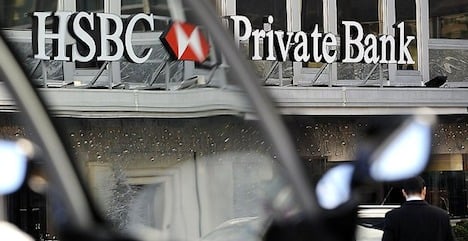The latest files in the so-called Swiss Leaks affair shows that during 2004 and 2005 the bankers had at least 1,645 meetings in 25 countries with clients or prospective clients, the newspapers Tages Anzeiger and Le Temps reported.
The meetings occurred in places as diverse as luxury hotels in Paris and Tel Aviv, a piano bar in Antwerp, the airport in Pointe-Noire, Congo, and a summer residence in Copenhagen.
The meetings conducted by "relations managers" were legal if they were just courtesy calls but not if business was done, such as when the bank obtained new funds or helped customers avoid taxes, the papers said.
Five of the 25 countries — the United States, France, Argentina, Spain and Belgium — have begun legal action against HSBC Switzerland.
According to one SwissLeaks file, a retired Turkish-born man met in Paris in January 2005 with a relations manager.
"The customer wanted to see me to discuss closing two accounts with Barclays and UBS and transferring the (money) to us," the file quoted the manager as saying, adding that he expected the bank to receive about one million dollars in the transaction.
The papers reported that the bankers also used the meetings to propose to their customers ways to avoid a European tax on deposits in Switzerland held by Europeans.
The tax, called the European Savings Directive, took effect in 2005.
As the directive concerned only accounts held by physical persons, HSBC Switzerland proposed that its clients create offshore companies and place their funds there, according to the files.
The files created global shockwaves on Monday, highlighting the financial dealings of the world's ultra-rich and prompting British lawmakers to launch an inquiry into the London-based bank.
Celebrities, alleged arms dealers and politicians are named in the files, though their inclusion does not necessarily imply wrongdoing.
Published at the weekend, the files claim that HSBC's Swiss division helped clients in more than 200 countries evade taxes on accounts containing $119 billion (104 billion euros).
Hervé Falciani, an IT worker turned whistleblower, stole the files in 2007 and passed them to French authorities, but they had not been previously made
public.
The International Consortium of Investigative Journalists obtained the files via French newspaper Le Monde and shared them with more than 45 other media organizations worldwide.
TAX EVASION
HSBC ‘pushed secret accounts in 25 countries’
Bankers from HSBC's Swiss division held hundreds of often illegal meetings with wealthy clients in 25 countries as part of their efforts to open undeclared accounts for them, Swiss media reported on Tuesday.
Published: 10 February 2015 15:00 CET

Photo: AFP
Url copied to clipboard!


 Please whitelist us to continue reading.
Please whitelist us to continue reading.
Member comments